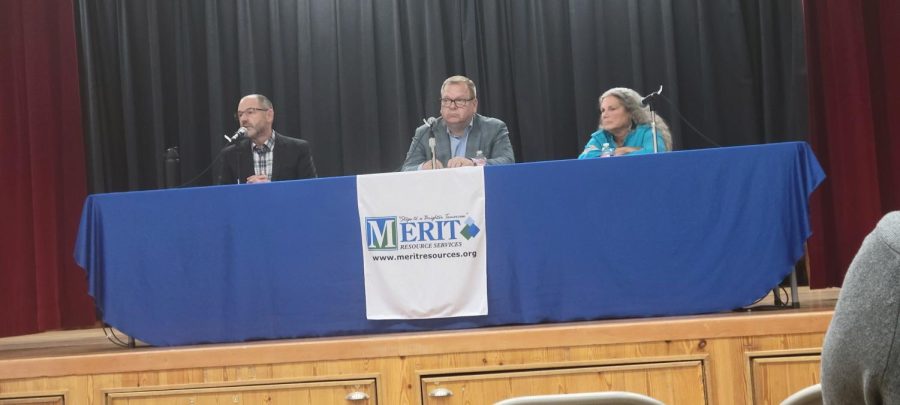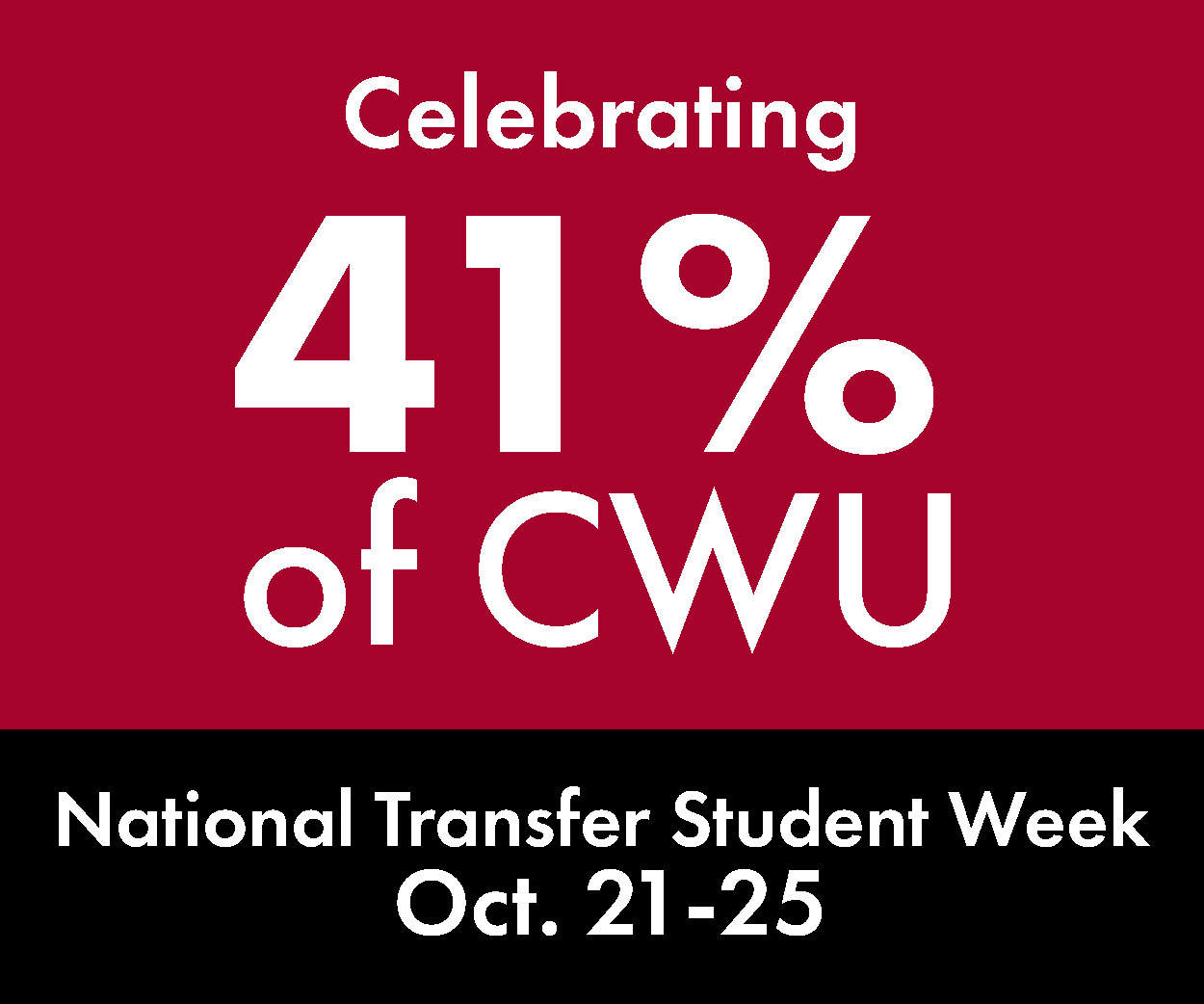Doctor panelists and community members weigh the role of medication in addiction treatment
Representative Tom Dent sheds light on stigma surrounding mental illness
May 3, 2023
Friendly chatter, free food and educational discussions created a welcoming atmosphere as attendees walked in the Hal Holmes Community Center for the Doctors Talk Addiction seminar on April 28.
Hosted by Merit Resources, the seminar was the second part of the “Let’s Talk Addiction” series first launched in September, Recovery Month, in 2020.
Melissa Denner, CWU alum, licensed mental health counselor at Merit Resources and organizer of the event, said that her passion for addiction recovery treatment is what inspired her to pitch this event to her boss and help put it on.
“It’s not just [about] the medical illness or disease,” Denner said. “It’s understanding the person with the addiction and understanding the experience of living in active addiction, and the process of experiencing finding a way out into active remission. It’s much more than an illness because it’s attached to people that we love.”
Organizing the event
Merit Resources is a local drug treatment and rehabilitation center that provides outpatient drug and alcohol treatment services in Ellensburg, Yakima, Sunnyside, Wapato, Toppenish, Pasco and Kennewick, according to meritresources.org.
Denner explained that the feedback and attendance for the first part of the series was positive enough to create a second part of the series featuring a panel of medical professionals.
“This idea of having a series so that we could bring together professionals who have frequent contact with people with substance use disorder or work directly with people with substance use disorder and include community members and family and friends, as well as people in recovery with lived experience,” Denner said.
Denner hopes the event brings relationships and connections in the community. She also mentioned how important it is for CWU students to be part of community discussions.
“I often think of Central when I’m doing things within the community, because students are here and some students at my last event came and they were one of the people who gave me the most positive feedback,” Denner said.
Pre-seminar
Vicki Strickland, drug court case manager at Merit, had been helping with preparations for the seminar for the past couple of months.
“I would say the importance of the event is to educate the community about addiction,” Strickland said.
Treatment director of Merit Pedro Lopez explained that one of Merit’s main goals of the event was to spread public awareness in regards to medication for opioid use disorder.
“What I wish to learn more is medications for opioid use disorder, medication assisted treatment, and really be able to see how we can bridge in medication treatment, a different type of cognitive behavioral therapy and how these two work together to get to the truth,” Lopez said
Medications and addiction
Denner asked the three panelists a series of questions that they took turns answering, and she took breaks between questions to give the audience a chance to ask their own questions.
Panelists included Clinical Pharmacist Dr. Nancy Hecox, PharmD, who specializes in chemical dependency, Executive Medical Director of the Washington Physicians Health Program (WPHP) and Clinical Associate Professor of Psychiatry at the University of Washington School of Medicine Dr. Chris Bundy and Board-certified family medicine specialist Dr. Greg Rehmann M.D.
Bundy spoke on the magnitude of the addiction issue that America faces and the role that medication plays in solving this issue.
“Medications are certainly a critical part to get you to dance, but they’re definitely not a part of an overall comprehensive approach to addiction,” Bundy said. “We don’t have an opioid epidemic in this country, we have an addiction epidemic in this country. Alcohol kills more people than opiods every year. Nicotine kills a quarter of magnitude more people than alcohol every year. But we’re really focused on opioids right now and we really need to look at the larger picture of addiction.”
Bundy said that addiction treatment from medicine has not been tested to its full capacity- there need to be more long-term data from longer studies.
“I hope that we have increasingly better treatments for the variety of different substances that can kill people,” Bundy said. “And that we stop thinking in terms of, ‘there’ll be a medication that will fix this,’ we need to do other things in addition to medication.”
Rehmann and Hecox felt similarly about the role of medication in addiction recovery; however, Hecox spoke more on abstinence from all medications as an end goal, while Rehmann leaned more towards catering to the goals of each individual.
“I love what [Hecox] said is that the final goal is abstinence- and it may not be for everyone,” Rehmann said. “I’m not the arbiter of somebody else’s recovery…Do you have a goal, is it a goal of abstinence?”
Hecox and the other doctors agreed that every addict’s recovery plan is their own and should not be compared to anyone else’s.
“Just because my frame of reference about what recovery is, doesn’t mean that has to be your frame of reference,” Hecox said. “Just because it’s just the way I did it or worked for me, it may not work for you.”
Cause and prevention
Bundy highlighted other important factors in recovery, such as a strong support system, that can help alongside medications.
“Never underestimate the value of the milieu of peers in terms of enhancing motivation and getting people over the next hurdle,” Bundy said.
In order to prevent cases of addiction in the future, Bundy said there needs to be a new way to approach the topic in education.
“There’s a whole field of early education, of drug education, in schools,” Bundy said. “Lots of things haven’t worked, like the ‘just say no’ generation. So, I think in terms of how you bring this to young people in schools is super important.”
Rehmann explained that one of the common misconceptions about drug use has to do with fentanyl. Rehmann and Bundy added that fentanyl addiction is mainly caused by illegal production and distribution.
“It really goes back to the [fact that] fentanyl is being produced illicitly and not by the corporations,” Rehmann said.
“In China actually, and then shipping in the US through Mexico,” Bundy said. “It’s actually a lot cheaper to make fentanyl in our lab in China than it is to grow opium in the opium poppy fields of Afghanistan…there’s definitely a market reason why fentanyl is what we see now in the illicit drug supply.”
According to Bundy, ever since cannabis legalization, the illicit cannabis drug supply has actually increased in the U.S. rather than decreased.
“Beware of the temptation to oversimplify,” Bundy said. “I’ve just really learned the hard way that it’s rarely a simple story. There’s rarely a simple answer. Things are complex, and [we need to] treat complex problems with complex solutions.”
Washington state representative Tom Dent spoke after the doctor’s talk about his connection to substance use.
“There’s a lot of stigma around mental health,” Dent said. “In particular, around addiction recovery, alcoholism, substance abuse, whatever the current term is. And it’s something that we can, everybody in this room, could work and change. Because there doesn’t have to be.”



Frank Sterle Jr. • May 3, 2023 at 5:44 pm
Upon learning that serious life trauma, notably adverse childhood experiences, is very often behind the addict’s debilitating addiction, I began to understand ball-and-chain self-medicating:
The greater the drug-induced euphoria/escape one attains from its use, the more one wants to repeat the experience; and the more intolerable one finds their sober reality, the more pleasurable that escape should be perceived.
By extension, the greater one’s mental pain or trauma while sober, the greater the need for escape from reality, thus the more addictive the euphoric escape-form will likely be.
Lasting PTSD mental pain is very formidable yet invisibly confined to inside one’s head. It is solitarily suffered, unlike an openly visible physical disability or condition, which tends to elicit sympathy/empathy from others.
It can make every day a mental ordeal, unless the turmoil is prescription and/or illicitly medicated.
Fortunately, the preconceived erroneous notion that drug addicts are simply weak-willed and/or have committed a moral crime is gradually diminishing.
Also, we know that pharmaceutical corporations intentionally pushed their very addictive and profitable opiates — I call it by far the real moral crime — for which they got off relatively lightly, considering the resulting immense suffering and overdose death numbers.
Typically societally overlooked is that intense addiction usually doesn’t originate from a bout of boredom, where a person repeatedly consumed recreationally but became heavily hooked — and homeless, soon after — on an unregulated often-deadly chemical that eventually destroyed their life and even those of loved-ones.
Either way, neglecting people dealing with debilitating drug addiction should never have been an acceptable or preferable political option.
But the more callous politics that are typically involved with lacking addiction funding/services tend to reflect conservative electorate opposition, however irrational, against making proper treatment available to low- and no-income addicts.
It’s like some people, however precious, are considered disposable.